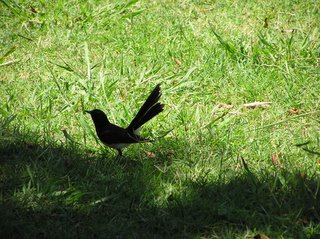The Art of Stalking

I spent last weekend with my new (to me) digital camera, Annie Dillard's Pilgram at Tinker Creek and a dilettante attitude under a gorgeous Moreton bay or Port Jackson fig at Orleigh Park, West End. I read and photographed, lazed and wondered. I promise to spend more days like that, rather than like this.
I had been reading Annie Dillard's treatise on how she discovered the art of stalking a musk rat. I followed her advice in a loose way - or at least was inspired by it (at p 184):
In summer, I stalk. Summer leaves obscure, heat dazzles, and creatures hide from the red-eyed sun, and me. I have to seek things out. The creatures I seek have several sense and free will; it becomes apparent that they do not wish to be seen.Annie Dillard speaks of losing herself in the stalking (at p 198 - 199):
[The muskrat] never knew I was there. I never knew I was there, either. ... My own self-awareness has disappeared. ... I wonder if we do not waste our energy just by spending every waking minute saying hello to ourselves.And so I tried to stalk a willy wagtail. There were other people at the park: a couple on another bench under another fig, a sole young man with his swag and a group of people having a picnic. All were absorbed in their own business but I could not evade my awareness of my slow and occassional halting to follow the willy wagtail with a camera. I'd stop where I thought I was just close enough and then cast a look about me to see who had been watching my creep towards the creature. I felt as an exhibit in Monty Python's Silly Walk museum. Invariably the casting about would lead to the willy wagtail flying to another perch and wagging its tail in a taunting, happy way.
This picture was taken while lying on a park bench engrossed in my reading of Annie Dillard's wondrous book. The willy wagtail flew to within inches of my nose and then landed on the grass, wagging a few teasing times. I extracted the camera from its case, pointed and shot.
If you have a interest in the world around you, read Annie Dillard. She sparks and amuses and her writing is nothing short of meditiatively incandescent. I feel as a child - renewed and wondering - when reading her work.

